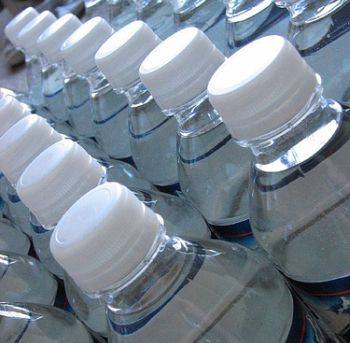
By John Curran
At the state maintenance garage where Lori Girard-Pion works, the water cooler isn't a luxury. It's a necessity, especially for the mechanics who maintain the Vermont State Police vehicle fleet.
So when the state of Vermont said it was doing away with bottled water deliveries for state go vernment offices and buildings in favor of drinking water from the tap, she wasn't happy.
Without it, workers at the Colchester garage will have to get their drinking water from a bathroom wash tub where mechanics wash their greasy hands, she says.
"Is that a lot to ask for?" Girard-Pion, an administrative assistant, wrote in a complaint to the state last month. "I think we have good reasons to keep our water cooler."
Turns out kicking the bottle is harder than it looks.
Now, state officials who touted the change as a way to go easy on the environment, save more than $200,000 annually on water purchases and support municipal water systems are scrambling to salvage the plan.
Workplace sanitation rules, tap water said to be smelly or visibly dirty and stiff opposition from employees insulted by the thought of having to provide their own water forced the administration of Gov. Peter Shumlin to postpone the July 1 adoption of the new policy.
In March, state officials rolled out the plan, calling bottled water a waste of taxpayer money and a luxury that flies in the face of the millions of dollars invested in public water systems to ensure the availability of clean, drinkable water for all.
Agency of Natural Resources Secretary Deb Markowitz cited environmental degradation associated with bottled water, saying toxic chemicals go into plastic water bottles, delivery trucks pollute the air and ecologically-sensitive stream headwaters are damaged by bottlers who draw the water from streams and rivers.
Under the policy, exceptions would be made when no clean tap water is available to employees, either because of no tap at all or problems with water quality.
The policy was to apply to executive branch locations of state government – not courts or the Legislature – and had the support of the Vermont State Employees Association, a union that represents about 7,000 state workers.
But when word went out, the complaints started coming in.
"As a dedicated state employee, I am offended at the small mind thinking and petty penny pinching decision to have us fend for ourselves for water," wrote Betsy Levine, a career development facilitator at a state Department of Labor office in Springfield. "How dare you!!!!!!" she wrote, comparing the decision to the Titanic because "only the ones at the top get saved."
Other written objections – obtained through a Public Records Act request by The Associated Press – contained similar sentiment:
_ "We work long hours inside, no air conditioning, and daily put our lives on the line to keep the convicted inmates secure and the public safe and now we cannot even have cool fresh water," wrote Michael Arace, who works at Southern State Correctional Facility. "Please reconsider." He said there are two heat-related injuries annually at the prison in Springfield.
_ Kristin Holt, who works in a probation and parole office in Burlington, said the tap water in her building has visible particulates in it and smells bad. "We would like permission to keep our water delivery or at the very least have a water quality inspector come and test our water to determine if it is safe or advisable to drink."
_ The Vermont Veterans Home in Bennington told the state that bottled water serves as the facility's emergency supply and shouldn't be taken away.
Rules got in the way, too.
State-adopted plumbing codes say that in buildings with 15 to 100 workers, a water fountain or bubbler is mandatory. And another is mandatory for each 100 employees over that. Eliminating the bubblers would mean the state would have to re-install fountains, a potentially costly proposition because of the plumbing work involved.
Also, under Vermont Occupational Safety and Health Administration rules, no food or beverages can be consumed by employees in a "toilet room," which rules out implementation of the bottled water ban in locations with no fountains or taps outside bathrooms.
But the state has checked drinking water at eight locations where employees complained about water quality and found that the water is potable in all of them, according to Michael Obuchowski, commissioner of the Department of Buildings and General Services.
For now, the state has appointed a panel to examine ways of going ahead with the phase-out without running afoul of workplace rules and practical considerations. Among them: whether it would cost more to re-install water fountains in buildings than to keep buying bottled water.
"There were enough situations raised (by employees) that we, in good conscience, couldn't ignore them," said Shumlin administration secretary Jeb Spaulding. "We're at a point where our state workforce, over the last few years, has been under a great deal of stress, with fewer employees doing the same amount of work, and taking pay cuts. It's important, as an employer, to do what you can to support the morale of your team."
Spaulding said the state hasn't given up on the idea. Concessions will have to be made, though, he said.
"I suspect we'll end up in a situation where we make clear what our goal is and ask our managers to comply with our goals in a way that allows some flexibility to deal with the situations they're in," Spaulding said. "If it's a highway garage and there's only a grease sink, maybe a bubbler makes sense."
Article courtesy of huffingtonpost.com

